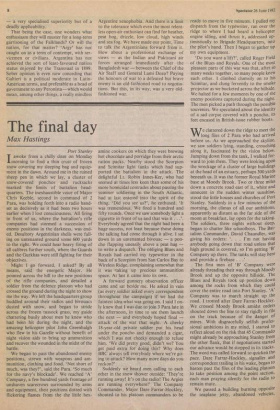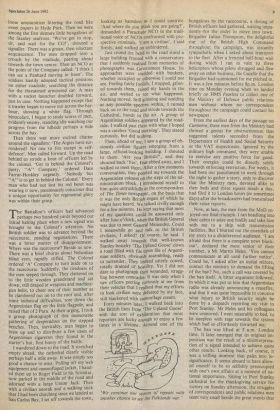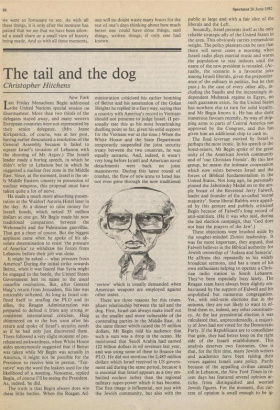The final day
Max Hastings
Port Stanley T awoke from a chilly doze on Monday /morning to find a thin crust of frozen snow covering my sleeping bag and equip- ment in the dawn. Around me in the ruined sheep pen in which we lay, a cluster of snow-covered ponchos and rucksacks marked the limits of battalion head- quarters. The inexhaustible voice of Major Chris Keeble, second in command of 2 Para, was holding forth into a radio hand- set as decisively as it had been two hours earlier when [lost consciousness. All firing in front of us, where the battalion's rifle companies had stormed a succession of enemy positions in the darkness, was end- ed. Desultory Argentinian shells were fall- ing on untenanted ground some 600 yards to the right. We could hear heavy firing of all calibres further south, where the Guards and the Gurkhas were still fighting for their objectives.
Might I go forward, I asked? By all means, said the energetic Major. He pointed across the hill to the new positions of the rifle companies, and detailed a soldier from the defence platoon who had crossed the ground during the night to show me the way. We left the headquarters group huddled around their radios and bivouacs dusted with snow, and began to stride across the frozen tussock grass, my guide chattering busily about men he knew who had been hit during the night, and the amazing helicopter pilot John Greenhalgh who flew in his Gazelle without benefit of night vision aids to bring up ammunition and recover the wounded in the midst of the battle.
We began to pass the abandoned enemy positions, strewn with weapons and am- munition, clothing and food. 'Not short of much, was they?', said the Para. `So much for the navy's blockade'. We reached 'A' Company, a few hundred yards frontage of unshaven scarecrows surrounded by arms and equipment, their positions dotted with flickering flames from the the little hex- amine cookers on which they were brewing hot chocolate and porridge from their arctic ration packs. Nearby stood the Scorpion and Scimitar light tanks which had sup- ported the battalion in the attack. The delightful Lt. Robin Innes-Ker, who had seemed at times less keen than some of his more homicidal comrades about passing the summer soldiering in the South Atlantic, had at last entered into the spirit of the thing. 'Did you see us?', he enthused. 'It was tremendous. We fired a hundred and fifty rounds. Once we saw somebody light a cigarette in front of us and that was it . . Everybody agreed that the night had been a huge success, not least because those doing the talking had come through it alive. I sat down in an untenanted bivouac — a pon- cho flapping uneasily above a peat hag — to write a dispatch. The obliging Blues and Royals had carried my typewriter in the back of a Scorpion from San Carlos Bay to Wireless Ridge, complaining somewhat that it was taking up precious ammunition space. At last it came into its own.
A forward gunnery observation officer came and sat beside me. He asked in vain (as every soldier asked every correspondent throughout the campaign) if we had the faintest idea what was going on. I said I on- ly knew that I was due to join 3 Para late in the afternoon, in time to see them launch the next — and everybody hoped final — attack of the war that night. A cheeky 18-year-old private soldier put his head under the poncho and demanded a cigar, which I was not cheeky enough to refuse him. 'We did pretty good, didn't we? You get paid extra for doing this? Why does BBC always tell everybody where we're go- ing to attack? How many more days do you reckon?'
Suddenly we heard men calling to each other in the snow shower outside: 'They're running away! It's on the radio! The Argies are running everywhere!' The Company Commander, Major Dare Farrar-Hockley, shouted to his platoon commanders to be ready to move in five minutes. I pulled my dispatch from the typewriter, ran over the ridge to where I had heard a helicopter engine idling, and thrust it, addressed op- timistically to Brigade Headquarters, into the pilot's hand. Then I began to gather up my own equipment.
`Do you want a lift?', called Roger Field of the Blues and Royals. One of the most pleasant parts of this war was that, after so many weeks together, so many people knew each other. I climbed clumsily on to his Scimitar, and clung fervently to the smoke projector as we bucketed across the hillside. We halted for a few moments by one of the enemy positions captured during the night. The men picked a path through the possible souvenirs. We speculated about the identity of a sad corpse covered with a poncho, its feet encased in British-issue rubber boots.
We clattered down the ridge to meet the ong files of 2 Para who had arrived before us. As we approached the skyline, we saw soldiers lying, standing, crouching along it, fascinated by the vision below. Jumping down from the tank, I walked for- ward to join them. They were looking upon the wreckage of a cluster of large buildings at the head of an estuary, perhaps 300 yards beneath us. It was the former Royal Marine base at Moody Brook. Two or three miles down a concrete road east of it, white and innocent in the sudden winter sunshine, stood the little houses and churches of Port Stanley. Suddenly in a few minutes of the morning, the climax of all our ambitions, apparently as distant as the far side of the moon at breakfast, lay open for the taking. The soldiers, three nights without sleep, began to chatter like schoolboys. The Bat- talion Commander, David Chaundler, was
giving his orders: . . I'm not having anybody going down that road unless that high ground is covered, so I'm getting 'IV Company up there. The tanks will stay here and provide a firebase . . •'
The first men of '13' Company were already threading their way through Moody Brook and up the opposite hillside. The Blues and Royals took up position down among the rocks from which they could cover the entire road into Port Stanley. 'A' Company was to march straight up the road. I trotted after Dare Farrar-Hockley. We crossed Moody Brook amidst orders shouted down the line to stay rigidly in file on the track because of the danger of mines. With disgracefully selfish profes- sional ambitions in my mind, I started to reflect aloud on the risk that 45 Commando might already be approaching Stanley from the other flank, that if negotiations started our advance would be stopped in its tracks. The word was called forward to quicken the pace. Dare Farrar-Hockley, signaller and correspondent trailing in his wake, began to hasten past the files of the leading platoon to take position among the point section, each man praying silently for the radio to remain mute.
We passed a building burning opposite the seaplane jetty, abandoned vehicles, loose ammunition littering the road like sweet papers in Hyde Park. Then we were among the first demure little bungalows of the Stanley seafront. 'We've got to stop, sir, and wait for the CO!', shouted a signaller. There was a groan, then reluctant acquiescence. The men dropped into a crouch by the roadside, peering ahead towards the town centre. Then an NCO at the point of the Company called: 'I think I can see a Panhard moving in front'. The soldiers hastily adopted tactical positions on either roadside, searching the distance for the threatened armoured car. A man with a rocket launcher doubled forward, just in case. Nothing happened except that a trawler began to move out across the har- bour, showing a white flag. Through binoculars, I began to study scores of men, evidently enemy, standing idly watching our progress from the hillside perhaps a mile across the bay.
Then there was more excited chatter around the signallers: 'The Argies have sur- rendered! No one to fire except in self- defence'. Men called forward. Up the road behind us strode a knot of officers led by the colonel. 'Get in behind the Colonel's party, "A" Company,' ordered Dare Farrar-Hockley urgently. 'Nobody but "A" is to get in behind the Colonel.' Every man who had not lost his red beret was wearing it now, passionately conscious that a unique opportunity for regimental glory was within their grasp.
The Battalion's officers had advanced perhaps two hundred yards beyond our initial halting place when a new signal was brought to the Colonel's attention. No British soldier was to advance beYond the racecourse, pending negotiations. There was a bitter mutter of disappointment. Where was the racecourse? Beside us now. There was a brief chorus about Nelsonian blind eyes, rapidly stifled. The Colonel ordered 'A' Company to turn aside on to the racecourse. Suddenly, the tiredness of the men seeped through. They clattered on to the little wooden grandstand and sat down, still draped in weapons and machine- gun belts, to cheer one of their number as he clambered out on to the roof and, after some technical difficulties, tore down the Argentinian flag on the little flagpole, and raised that of 2 Para. At their urging, I took a group photograph of this memorable gathering of desperadoes on the stepped benches. Then, inevitably, men began to brew up and to distribute a few cases of Argentinian cigarettes they found in the starter's hut, first booty of the battle.
I wandered down to the road. It stretched empty ahead, the cathedral clearly visible Perhaps half a mile away. It was simply too good a chance to miss. Pulling off my web equipment and camouflaged jacket, I hand- ed them up to Roger Field in his Scimitar, now parked in the middle of the road and adorned with a large Union Jack. Then with a civilian anorak and a walking stick that I had been clutching since we landed at San Carlos Bay, I set off towards the town, looking as harmless as I could contrive. 'And where do you think you are going?', demanded a Parachute NCO in the tradi- tional voice of NCOs confronted with pro- spective criminals, am a civilian', I said firmly, and walked on unhindered.
Just round the bend in the road stood a large building fronted with a conservatory that I suddenly realised from memories of photographs was Government House. Its approaches were studded with bunkers, whether occupied or otherwise I could not see. Feeling fairly foolish, I stopped, grinn- ed towards them, raised my hands in the air, and waited to see what happened. Nothing moved. Still grinning and nodding at any possible spectres within, I turned back on to the road and strode towards the Cathedral, hands in the air. A group of Argentinian soldiers appeared by the road- side. I walked past them with what I hoped was a careless 'Good morning'. They stared curiously, but did nothing.
Then, ahead of me, I saw a group of ob- viously civilian figures emerging from a large, official-looking building. I shouted to them: 'Are you British?', and they shouted back 'Yes'. Fear ebbed away, and I walked to meet them. After a few moments conversation, they pointed me towards the Argentinian colonel on the steps of the ad- ministration block. I introduced myself to him quite untruthfully as the correspondent of The Times newspaper, on the basis that it was the only British organ of which he might have heard. We talked civilly enough for a few minutes. He kept saying that most of my questions could be answered only after four o'clock, when the British General was due to meet General Menendez. Could I meanwhile go and talk to the British civilians, I asked? Of course, he said. I walked away towards that well-known Stanley hostelry 'The Upland Goose' down a road filled with file upon file of Argenti- nian soldiers, obviously assembling, ready to surrender. They looked utterly cowed, totally drained of hostility. Yet I did not dare to photograph their wounded, stragg- ling between comrades. It was only when I saw officers peering curiously at me from their vehicles that I realised that my efforts to look civilian were defeated by my face, still blackened with camouflage cream.
Forty minutes later, I walked back into the British lines from 'The Upland Goose' with the sort of exhilaration that most reporters are lucky enough to enjoy a few times in a lifetime, Around one of the
'We continue our season of repeats with another chance to see the Falklands war.'
bungalows by the racecourse, a throng of British officers had gathered, waiting impa- tiently for the order to move into town. Brigadier Julian Thompson, the delightful star of the British High Command throughout the campaign, was instantly sympathetic when I asked about transport to the fleet. After a frenzied half-hour wait during which I ran in vain to three helicopters whose pilots shrugged and flew away on other business, the Gazelle that the Brigadier had summoned for me pitched in. It was a few minutes before 8p.m. London time on Monday evening when we landed briefly on HMS Fearless to collect one of the Ministry of Defence public relations men without whom no correspondent throughout the campaign could contact his newspaper.
From the earliest days of the passage on Canberra, these men from the Ministry had showed a genius for obstructionism that suggested talents seconded from the Department of Health and Social Security or the VAT inspectorate. Ignored by the military high command, they were unable to exercise any positive force for good. Their energies could be directly solely towards enforcing restriction. For weeks, it had been our punishment to work through the night to gather a story, only to discover that the Ministry men, devoted alike to their beds and three square meals a day, had filed it to London hours (or sometimes days) after the broadcasters had transmitted their voice reports.
Now, at last, the men from the MoD en- joyed one final triumph. I ran headlong into their cabin to seize one bodily and take him with me to a ship with transmission facilities. But I blurted out the essentials of my story to a disinterested audience. 'I am afraid that there is a complete news black- out', declared the most senior of their number, a Mr Martin Helm. 'You cannot communicate at all until further notice'. Could he, I asked after an initial seizure, contact the ministry to demand the lifting of the ban? No, such a call was covered by the ban itself. A bitter argument followed, in which it was put to him that Argentinian radio was already announcing a ceasefire, and that it was quite impossible to conceive what injury to British security might be done by a dispatch reporting my visit to Port Stanley. Mr Helm and his colleagues were unmoved. I went miserably to bed, to lie sleepless with rage towards the system which had so effortlessly thwarted me.
The ban was lifted at 3 a.m. London time. It later emerged that its original im- position was the result of a misinterpreta- tion of a signal intended to achieve quite other results. Looking back, of course, it was a trifling moment that pales into in- significance. It seems absurd to have allow- ed oneself to be so selfishly preoccupied with one's own affairs at a moment of na- tional importance. Sitting in Port Stanley cathedral for the thanksgiving service for victory on Sunday afternoon, the struggles of correspondents and public relations men seem very small beside the great events that we were so fortunate to see. As with all these things, it is only after the moment has passed that we see that we have been allow- ed a small share or a small view of history being made. And as with all these moments, one will no doubt waste many hours for the rest of one's days thinking about how much better one could have done things, said things, written things, if only one had known.
























































 Previous page
Previous page